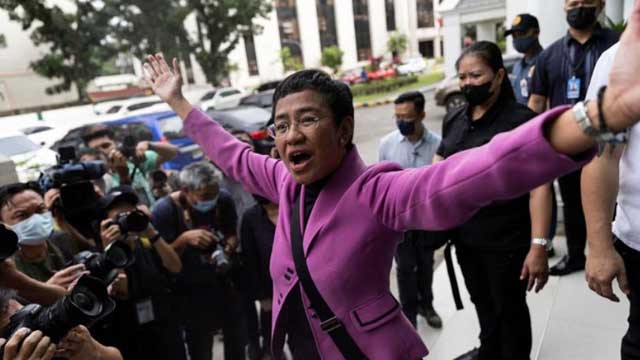Philippine Nobel laureate Maria Ressa was cleared on Tuesday of tax evasion following a five-year legal battle, hailing the verdict as a win for press freedom and voicing hope she will be cleared of other charges she insists are politically motivated.
The 59-year-old, who won a Nobel Peace Prize in 2021, has been fighting multiple charges filed during former president Rodrigo Duterte’s administration.
Despite the acquittal, Ressa and Rappler, the news website she co-founded in 2012, face an uncertain future as they contest another two court cases.
A vocal critic of Duterte and his deadly drug war, Ressa has long maintained that the charges against her and Rappler were politically motivated.
‘You gotta have faith,’ a visibly relieved Ressa told reporters outside the court after the acquittal.
‘Guys, it’s up to us. We hold the line, and this proved that we can hold the line.’
Ressa and Rappler had faced five government charges of tax evasion stemming from the 2015 issue of Philippine depositary receipts, used by companies to raise money from foreign investors.
A court acquitted them on four charges in January. The fifth was heard by a different court, which cleared her and Rappler of wrongdoing on Tuesday.
‘Today, we celebrate the triumph of facts over politics,’ Rappler said in a statement.
‘We thank the court for this just decision and for recognizing that the fraudulent, false, and flimsy charges made by the Bureau of Internal Revenue do not have any basis in fact.’
Human Rights Watch senior researcher Carlos Conde said the acquittal of Ressa and Rappler was ‘long overdue’ and urged President Ferdinand Marcos to ‘ensure that legal harassment of Maria Ressa and other journalists ends’.
Ressa and a former colleague Rey Santos Jr are appealing a cyber libel conviction that carries a nearly seven-year jail sentence.
Rappler, meanwhile, is challenging a Philippine Securities and Exchange Commission order to close for allegedly violating a ban on foreign ownership in media.
Under the constitution, only Philippine citizens or entities controlled by citizens can invest in the media.
That case springs from a 2015 investment by the US-based Omidyar Network, established by eBay founder Pierre Omidyar.
The Omidyar Network later transferred its Rappler investment to the site’s local managers to stave off efforts by Duterte to shut it down.
Despite the remaining hurdles, Ressa was characteristically defiant and optimistic on Tuesday, telling reporters the latest acquittal ‘strengthens our resolve to continue with the justice system’.
‘It shows that the court system works and we hope to see the remaining charges dismissed,’ she said.
Ressa and Rappler’s legal troubles began in 2016 with the election of Duterte, who frequently launched foul-mouthed attacks against his critics.
They have faced what press freedom advocates describe as a grinding series of criminal charges, arrests and online abuse.
Duterte’s government claimed it had nothing to do with any of the cases against Ressa.
Another high-profile Duterte critic, human rights campaigner Leila de Lima, has spent more than six years in jail on drug trafficking charges she said were fabricated to silence her.
Throughout the campaign against her, Ressa, who is also a US citizen, has remained based in the Philippines.
She is on bail pending the appeal against her cyber libel conviction and is required to apply for court approval when she wants to travel abroad.
That included her trip to Norway in December 2021 to collect her Nobel Peace Prize.
Ressa and Russian journalist Dmitry Muratov were jointly awarded the Nobel for their efforts to ‘safeguard freedom of expression’.
Marcos, who succeeded Duterte in June 2022, previously said he would not interfere in Ressa’s cases, citing the separation of powers between the executive and judicial branches of government.





